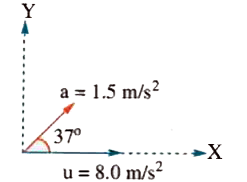A particle moving with a velocity equal to 0.4ms−1 is subjected to an acceleration of 0.15ms−2 for 2 seconds in a direction at right angles to the direction of motion. The magnitude of the final velocity is
0.3ms−1
0.4ms−1
0.5ms−1
0.7ms−1
The correct Answer is:C
Step by step video solution for A particle moving with a velocity equal to 0.4ms^(-1) is subjected to an acceleration of 0.15ms^(-2) for 2 seconds in a direction at right angles to the direction of motion. The magnitude of the final velocity is by Physics experts to help you in doubts & scoring excellent marks in Class 11 exams.
Updated on:21/07/2023Similar Questions
A particle has an initial velocity (6ˆi+8ˆj)ms−1 and an acceleration of (0.8ˆi+0.6ˆj)ms−2. Its speed after 10s is
View SolutionA particle has initial velocity 4i+4jms−1 and an acceleration −0.4ims−2, at what time will its speed bbe 5ms−1?
View SolutionA particle of mass 1031kg is moving with a velocity equal to 105ms−1. The wavelength of the particle is equal to
View SolutionA particle is moving eastwards with a velocity of 5ms−1. In 10seconds the velocity changes to 5ms−1 northwards. The average acceleration in this time is
View SolutionA particle moves in the x-y plane with a constant acceleration of 1.5m/s2 in the direction making an angle of 37∘ with the x-axis.

At t=0 the particle is at the origin and its velocity is 8.0m/s along the x- aixs . Find the velocity and the position of the particle at t = 4.0s.
View SolutionA ball of mass 0.5 kg is moving with a velocity of 2ms−1. It if subjected to a force of x Newton for 2s. Because of this force, the ball moves with a velocity of 3ms−1 . The value of x is :
View SolutionAssertion: In projectile motion, the acceleration is constant in both magnitude and direction but the velocity changes in both magnitude and direction.
Reason: When a force or accelration is acting in an oblique direction to the direction of velocity then both magnitude and direction of the velocity may be changed.
View SolutionA particle movesin the X-Y plane with a constasnt acceleration of 1.5ms2 in the direction making an angle of 370 with the X-axis.At t=0 the particle is at the orign and its velocity is 8.0 m/s along the X-axis. Find the velocity and the position of the particle at t=4.0 s.

View SolutionA particle starts moving with initial velocity u=25ms−1 and retardation a=−2ms−2. Draw the velocity-time graph.
View SolutionA particle moves along a straight line path. After some time it comes to rest. The motion is with constant acceleration whose direction with respect to the direction of velocity is :
View Solution
